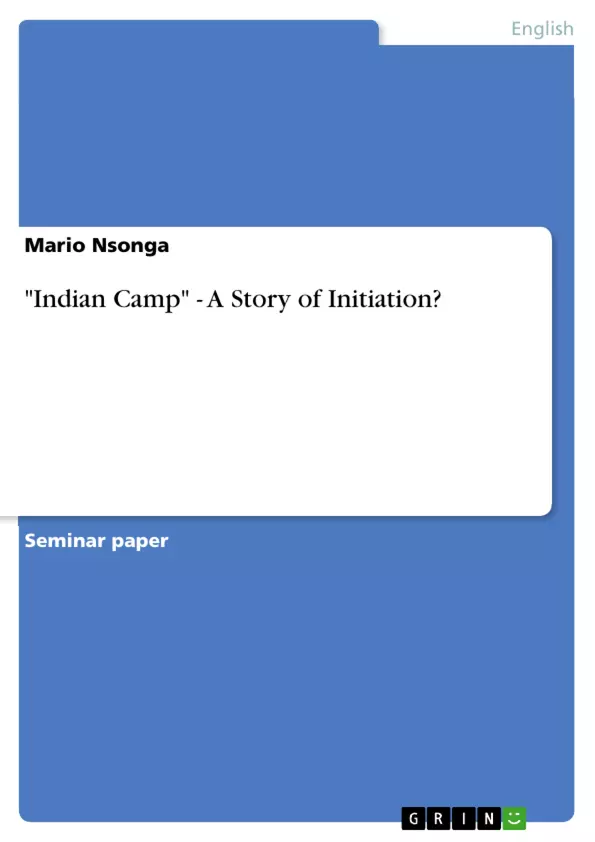Many critics regard Ernest Hemingway’s short fiction as typical stories of initiation. However, by taking a closer look at his short story “Indian Camp”, this paper will not only reveal the complexity and controversy of this term, but also answer the question whether one might classify this short story as a genuine story of initiation or not...
Table of Contents
- Introduction
- What is a Story of Initiation?
- Origins of the Term
- Aspects of Initiation
- Analysis of "Indian Camp"
- The Existence of Evil
- The Loss of Innocence
- Socialization
- Self-Discovery and Self-Realization
- Conclusion
Objectives and Key Themes
This paper aims to analyze Ernest Hemingway's short story "Indian Camp" and determine whether it qualifies as a story of initiation. It will examine the complexities and varied interpretations of the term "initiation story," providing a framework for analyzing the story's themes and the protagonist's development.
- Definition and complexities of the "initiation story" narrative.
- The role of experience and the loss of innocence in shaping the protagonist.
- Exploration of themes of evil, socialization, and societal expectations.
- Analysis of the protagonist's self-discovery and the permanence of his changed perspective.
- Application of different types of initiation (tentative, uncompleted, decisive) to the story.
Chapter Summaries
Introduction: This introductory chapter establishes the paper's central question: does Hemingway's "Indian Camp" function as a story of initiation? It acknowledges the prevalent critical view of Hemingway's short stories as initiation narratives and sets the stage for a nuanced investigation into the story's complexities. The introduction highlights the inherent challenges in defining "initiation story" due to its multifaceted interpretations, previewing the analytical approach that will be employed.
What is a Story of Initiation?: This chapter delves into the various interpretations and definitions of "initiation story," highlighting the lack of a universally accepted definition. It explores the work of Marcus, who proposes three categories of initiation: tentative, uncompleted, and decisive. The chapter emphasizes the significance of a permanent impact on the protagonist as a crucial element in classifying a story as an initiation narrative. By acknowledging the diverse meanings and complexities surrounding the term, the chapter prepares the groundwork for analyzing “Indian Camp” through this framework.
Analysis of "Indian Camp": This chapter will contain a detailed analysis of Hemingway's "Indian Camp," examining the story's narrative structure and thematic elements to determine if it aligns with the characteristics of an initiation story. The analysis will likely explore how the protagonist's experiences contribute to his understanding of the adult world, and the lasting impact these events have on his worldview and sense of self. This section will discuss whether the events in the story constitute a "tentative," "uncompleted," or "decisive" initiation.
Keywords
Ernest Hemingway, Indian Camp, Initiation Story, Loss of Innocence, Coming-of-Age, Socialization, Evil, Tentative Initiation, Self-Discovery.
Frequently Asked Questions: Analysis of Ernest Hemingway's "Indian Camp"
What is the purpose of this document?
This document provides a comprehensive preview of an academic paper analyzing Ernest Hemingway's short story "Indian Camp," specifically examining whether it qualifies as a story of initiation. It includes a table of contents, objectives, key themes, chapter summaries, and keywords.
What are the key themes explored in the analysis of "Indian Camp"?
The analysis explores several key themes, including the definition and complexities of the "initiation story" narrative, the role of experience and loss of innocence in shaping the protagonist, themes of evil, socialization, and societal expectations, the protagonist's self-discovery and the permanence of his changed perspective, and the application of different types of initiation (tentative, uncompleted, decisive) to the story.
What is the central question addressed in the paper?
The central question is whether Hemingway's "Indian Camp" functions as a story of initiation. The paper acknowledges existing interpretations and aims to provide a nuanced investigation.
How does the paper define "initiation story"?
The paper acknowledges the lack of a universally accepted definition of "initiation story." It explores different interpretations and utilizes Marcus's categorization of initiation into tentative, uncompleted, and decisive types, emphasizing the significance of a permanent impact on the protagonist.
What are the different types of initiation discussed?
The paper discusses three types of initiation proposed by Marcus: tentative, uncompleted, and decisive. The analysis will apply these categories to determine the type of initiation, if any, experienced by the protagonist in "Indian Camp."
What is included in the chapter summaries?
The chapter summaries provide brief overviews of the introduction, a chapter defining "initiation story," and a chapter dedicated to the detailed analysis of "Indian Camp." The introduction sets the stage for the analysis, the second chapter explores the complexities of defining an initiation story, and the third chapter details the analysis of "Indian Camp" itself, examining its thematic elements and narrative structure.
What are the keywords associated with this analysis?
The keywords associated with this analysis include Ernest Hemingway, Indian Camp, Initiation Story, Loss of Innocence, Coming-of-Age, Socialization, Evil, Tentative Initiation, and Self-Discovery.
What is the overall approach of the paper?
The paper uses a structured and analytical approach, examining "Indian Camp" through the lens of initiation story theory. It aims to provide a nuanced and in-depth interpretation of the story's themes and the protagonist's development.
- Quote paper
- Mario Nsonga (Author), 2010, "Indian Camp" - A Story of Initiation?, Munich, GRIN Verlag, https://www.grin.com/document/207833



